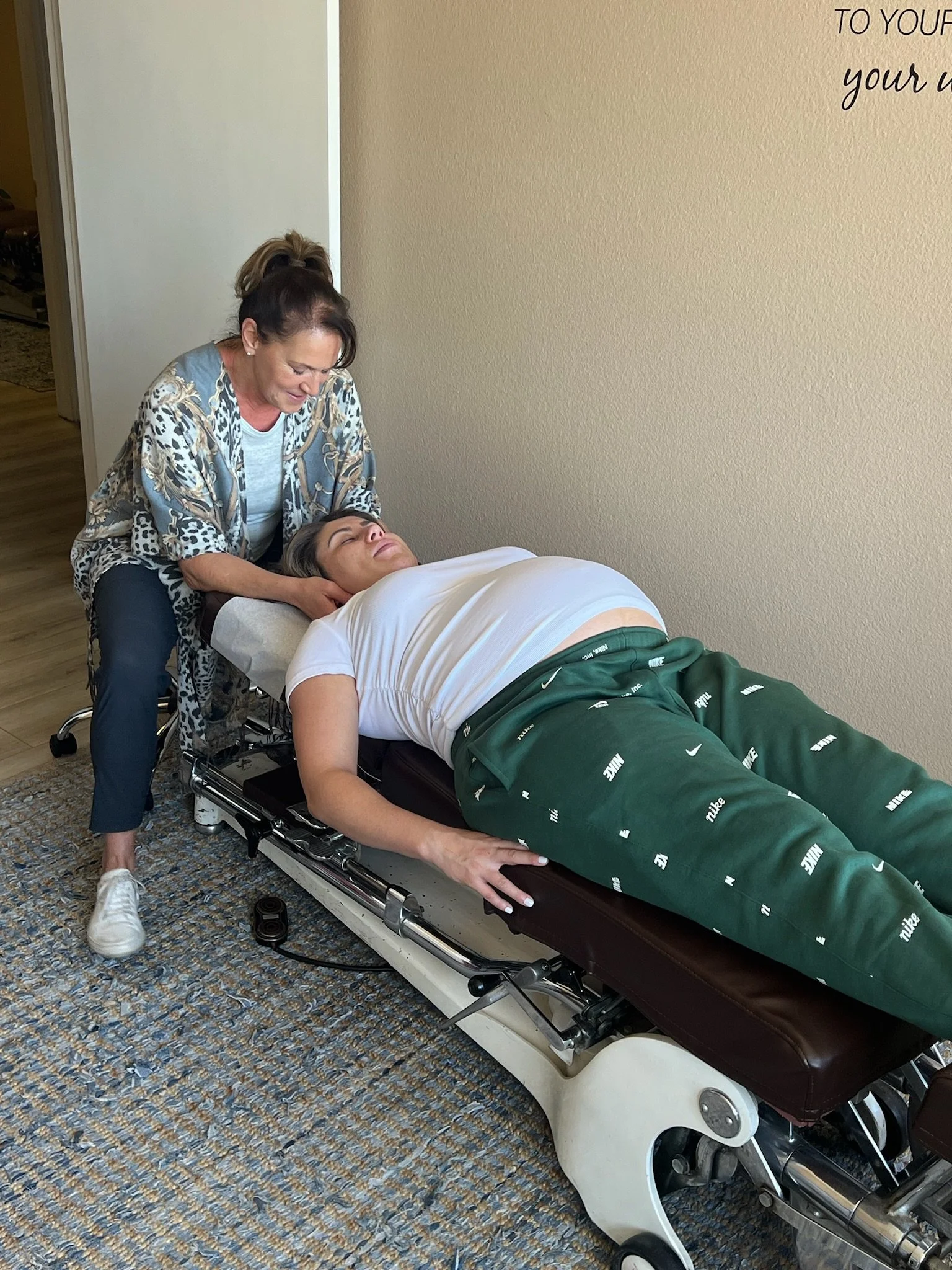
You Don't Have to Accept Being Exhausted All the Time: Here's How to Get Your Energy Back
Chronic exhaustion, anxiety, and sleep struggles may be rooted in nervous system dysregulation. Learn how neurologically focused chiropractic care helps restore energy and balance from the inside out.

It Is Not Just Tongue and Lip Ties. It Is About Your Baby’s Nervous System.
Here is what many parents are never told in those early postpartum days or quick pediatric visits.
When a baby has feeding challenges along with reflux, colic, constipation, tension, or difficulty sleeping flat, the tie is often not the whole story. It is a sign that the nervous system is under stress.
You are not imagining this.
You are not being overly worried.
And your instinct that something deeper is going on is worth listening to.

The #1 Tip To Prepare For Birth
Dear Mama,
You’re doing everything right, but if you’re honest, your body is still holding a lot of stress.
Your nervous system is running the show during pregnancy, and your baby is learning from it every single day. When your system is regulated, your body knows how to birth, bond, and recover.
Supporting your nervous system now isn’t just for you. It’s one of the greatest gifts you can give your baby.

The Real Reason Stretching Isn’t Fixing Your Baby’s Torticollis
Those stretches aren't working because they're treating the symptoms, not the root cause. And while you're waiting and stretching, that subluxation in your baby's upper spine is affecting far more than just their neck. It's impacting their ability to eat, sleep, drain fluid from their ears, and hit developmental milestones.

What To Expect in the Scan Room
Here's what we've learned after working with thousands of families: these seemingly different challenges often share a common thread—a wound-up, dysregulated nervous system that's stuck in overdrive.

How to Advocate For Your Child
The medical system is built for speed and efficiency. But your child's healthcare decisions? Those don't have to happen at warp speed just because everyone around you is moving fast.

Do Infants Grow Out of Colic?
If you're a parent dealing with a colicky baby, you've probably heard these words from well-meaning healthcare providers: "Don't worry, they'll grow out of it." But here's what no one is telling you—babies don't just grow out of colic. They grow into other challenges.

Your Baby's Brain Doubles in Size - Here's What You Must Know
Here's a fact that will blow your mind: within the first year of life, your baby's brain will double in size and form over 1 million neural connections every second. This makes the first twelve months the most critical period for neurological development your child will ever experience.

Too Many Therapies, Not Enough Results?
you're not missing anything. You're not failing your child.
The truth is, you may actually be doing too much.

The Hidden Truth About Autism Levels Your Doctor Won't Tell You
ou're living with a child who may not be able to speak, who struggles to sleep through the night, and who experiences sensory overload that leads to hours of distress. You've watched your little one seem trapped in a nervous system stuck in constant overdrive, while you run on empty, trying to hold everything together.
And through it all, you've probably been told the same thing over and over: "It's genetic. This is just how your child is wired."
But what if there's something deeper—something that actually explains why your child can't connect, can't regulate, and can't develop the way they're meant to?

What Blood Work and MRIs Can't Detect in Your Child
You're not alone, and more importantly, you're not wrong. There's something crucial missing from your child's healthcare journey – an assessment that could finally reveal the real root cause of their health challenges.

This Nervous System Imbalance Is Sabotaging Your Child's School Year
If you're like most parents we meet, you've probably tried behavior charts, talked to counselors, maybe even considered medication for your child's struggles at school, but you're still searching for answers that actually address what's really going on. We totally get it.

The Missing Piece To Your Child's Healing Revealed
If you're like most parents we work with, you've probably tried everything. Behavior modification charts, occupational therapy sessions, dietary changes, calming techniques – yet your child's struggles continue. You've dealt with constant tantrums, sensory meltdowns, and behavioral challenges that seem to come out of nowhere. When your child can only wear certain clothes, has extreme reactions to everyday sounds, or struggles with anxiety that makes simple activities feel impossible, it's exhausting and heartbreaking.
Here's what we want you to know: It's not your fault. And it's not their fault either.

Beyond Burnout: Getting Parents Their Energy Back
If you've tried every sleep hack, energy drink, supplement, and fitness trend out there—and still feel worn out, foggy, and running on fumes—you're not lazy, and you're not broken. You're likely stuck in survival mode because your nervous system is stuck there, too.

Why Your Child's Progress Stalled (And Why That's Actually Good)
Are you feeling frustrated or even disheartened because your child seemed to be making incredible progress with their neurological challenges, and then suddenly... everything stalled?

Surviving Holiday Celebrations When Your Child Has Sensory Overload
If you're like many parents we meet, you've probably tried everything—noise-canceling headphones, watching fireworks from a distance, or even avoiding celebrations altogether. But what if I told you that these well-meaning strategies only address the symptoms, not the actual root cause of your child's sensory overload?

The Best Mom Hack For Colic And More
Have you ever noticed how your baby seems perfectly content in your arms, but the moment someone else holds them, the waterworks begin? Or how does your little one somehow sense when you're stressed and respond in kind? Or why healthcare providers prioritize skin-to-skin contact right after birth?

Understanding Fevers: Why Your Child's Fever Might Actually Be a Good Thing
It's the middle of the night, and you're jolted awake by your child's warm forehead and flushed cheeks. Your heart races as you scramble for the thermometer, confirming what you already knew – your child has a fever.

A Special message For Our Inspire Life Chiropractic Mommas…
We see you showing up when it’s hard. We see you prioritizing your health while managing a hundred other things. We see you being intentional about your care so you can better care for your children. And we see the ripple effect of that choice—not just in your body, but in your energy, your patience, and your joy.

An Exhausted Mom's Survival Guide: Navigating Motherhood with Adaptability and Resilience
Motherhood is an excessive amount of responsibilities, from caring for our children to managing household chores, work commitments, and more. It often feels like there needs to be more hours in the day to accomplish everything on our to-do lists.
